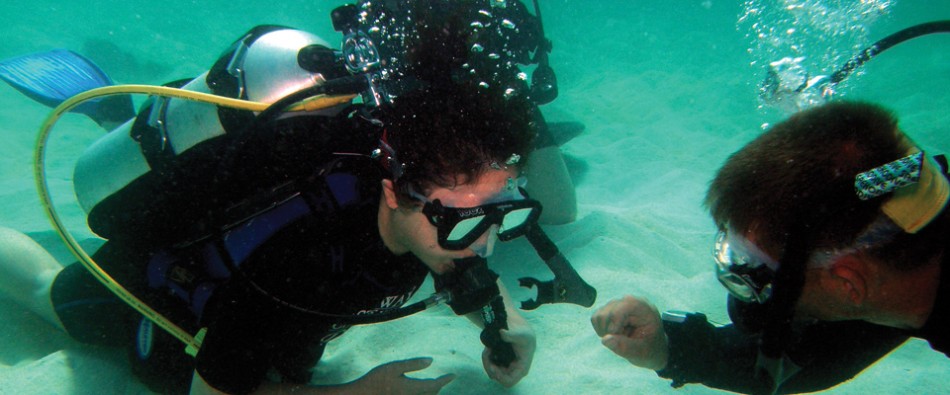
Learning To Dive – Part 1
I’ve been saying I’m going to learn to dive for the last 3 years. Every time I visit Castaway my staff have asked me expectantly “Are you going to learn to dive this time?” And every time I’d say “I’m too busy, next time.” But Simon our dive shop manager is going to leave soon and having known him for so long I wanted to learn to dive before he left. So finally this trip was it. This is when I would learn to dive.
Having decided to learn to dive I was then faced with another choice. The first level of diving proficiency is known as the ‘Open Water’ course and Castaway Divers offers Open Water courses from two diving organisations, PADI and SDI. As you’ll hear later on, the difference in terms of practical training is very small. But the theory is a little different. So I looked at the size of the PADI manual and I looked at the SDI manual. The SDI manual was smaller. SDI won. Not the most scientific way to make a decision I know. Then I found that I could study the SDI course online for the same price as studying with a manual. That clinched it for me.
Before I could even approach a piece of diving equipment I had to put in some time studying. The knowledge is split into 5 areas. You start off learning very general stuff about the underwater environment. How light changes underwater. How sound travels faster in water than in air. How you lose heat 25x faster in water, etc, etc. You learn about tides, currents and waves. All interesting stuff and important to know.
After that you learn about the physics of diving and how a human body reacts to the underwater environment. It was a walk down memory lane re-visiting high school physics and remembering Boyle’s Law (the volume of a gas is inversely proportional to the ambient pressure). It turns out that a lot of what you learn in diving is based around understanding and appreciating this one simple law.
In the online course the 5 modules are spread over 16 lessons. At the end of each lesson there is a quiz of a few questions. Get one answer wrong and you have to review the whole lesson before taking the quiz again with slightly different questions.
It was here that I fell slightly out of love with SDI. Some of the questions were badly phrased and either contradicted the text or weren’t even covered in the text. I had to repeat a couple of chapters. I got so frustrated I sent SDI an email complaining. And they wrote straight back to me saying they would look into it. And a few days later they wrote again saying they’d reviewed the areas I’d pointed out and changed them. That was impressive. An organisation that listens!
I still had 3 more modules to study. The third and fourth modules are all about scuba equipment and skills development. Some of it seemed a bit simple (masks, fins and snorkels) whilst some of it seemed a bit esoteric (BCD Inflator Hose Attachment). The final module is all about planning a dive and what can happen during a dive. It was all new and fascinating, although a lot of it would only really sink in when practising the skills in the water.
Finally there was a 60+ question knowledge review of the 5 modules. The pass mark is 80%, but having completed all the quizzes for each chapter it was very easy. I didn’t time myself but I guess I spent about 7 hours studying.
See my next post for a report on my first experiences with the equipment and getting in the water.
